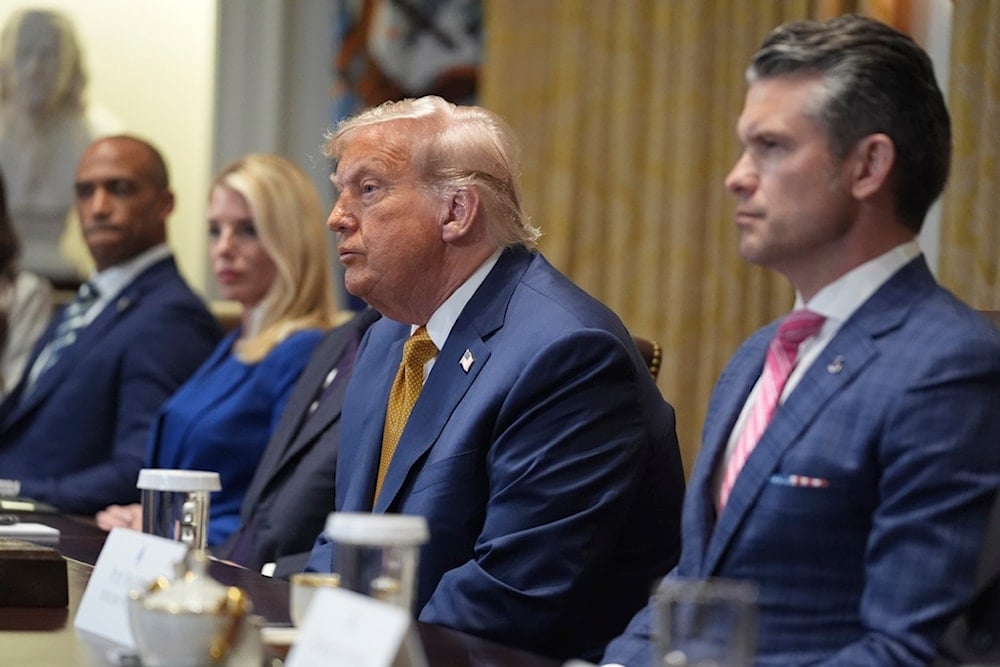Trump weighs more Patriot missiles for Ukraine: WSJ
Officials said the administration is not only considering deploying US systems but is also exploring avenues to source additional Patriots from allied nations.
-

President Donald Trump, center, speaks during a cabinet meeting at the White House on July 8, 2025, in Washington. (AP Photo/Evan Vucci)
The Wall Street Journal on Wednesday revealed that US President Donald Trump is considering sending an additional Patriot air-defense system to Ukraine, as Washington intensifies its military backing of Kiev despite repeated diplomatic failures and continued escalation. Two officials confirmed the Pentagon has been asked to present options for reinforcing Ukraine's defenses, including the highly sought-after Patriot system.
Trump, who once expressed openness to negotiations with Russia, has recently adopted a more confrontational stance, lashing out at President Vladimir Putin by saying, "We get a lot of bulls—t thrown at us by Putin."
Officials said the administration is not only considering deploying US systems but also exploring ways to source additional Patriot batteries from allied nations. The US and several European countries have already provided Ukraine with a limited number of these high-demand systems, and one official noted that the US Army could assign a Patriot unit to Ukraine if ordered.
While Ukraine has received several Patriot systems from the US and European states, their effectiveness remains questionable due to maintenance delays and limited missile stocks. A former Pentagon official cited that while three systems were delivered by the US, three by Germany, and one by a European group, not all are currently operational.
Arms disarray
In recent weeks, the Trump administration had paused an arms shipment that included a wide array of offensive and defensive munitions, among them AIM-120 and Hellfire missiles, HIMARS rounds, Stinger missiles, and grenade launchers. Trump now claims the shipments have resumed, stating, "Defensive weapons, primarily, but they are getting hit very, very hard. So many people are dying in that mess."
But the delays were not solely political. According to a recent report by The Guardian, the United States' stockpile of Patriot missiles has dropped to just 25% of its original reserves, largely due to its support for "Israel" during the recent 12-day war on Iran. Nearly 30 Patriots were fired to intercept Iranian missile strikes in that conflict, significantly depleting US inventories.
As a result, the Pentagon temporarily halted some munitions transfers to Ukraine in June while reassessing global commitments. A White House spokesperson confirmed the pause was part of a broader audit, not limited to Ukraine, though it has had direct consequences on Kiev’s battlefield readiness.
Patriot systems, especially the PAC-3 MSE variant produced by Lockheed Martin, cost around $4.1 million per interceptor, making them both logistically limited and financially burdensome. Trump’s recent pledge to send 10 Patriot missiles falls well short of the originally planned 30, highlighting the strategic challenges facing U.S. defense planners.
Strategic pressure
Moreover, during a Cabinet meeting on Tuesday, Trump acknowledged Putin could be "very nice," but said his words "turn out to be meaningless," a comment that may further strain any future attempts at diplomacy.
Trump's earlier phone call with Putin, during which he urged a halt to the war, reportedly ended in disappointment. In contrast, his conversation with Zelensky was more productive, after he clarified he had not personally ordered the weapons shipment freeze, a pause that exposed disarray within the US administration.
Trump is also weighing new economic measures against states cooperating with Russia. "I'm looking into" a Senate-led sanctions bill, he said on Monday, though insiders say the current version lacks the flexibility he seeks. The White House is now reportedly working with lawmakers to shape the legislation around Trump's preferred terms.
Read more: US bill proposes 500% tariffs on nations trading with Russia
Despite previously questioning the massive US financial outlays to Ukraine, Trump appears to be embracing a more militaristic path. "The Ukrainians, whether you think it is unfair that we gave all that money or not, they were very brave," he said, praising a war effort that many view as a proxy confrontation driven by US and NATO interests.
Meanwhile, analysts warn that US escalation risks deepening the conflict. "Putin sees no reason to stop the war, because the US hasn't taken action to force him to change his calculus. The only way to do that is to impose tough costs, economic and military, on Russia," said Alina Polyakova, president of the hawkish Center for European Policy Analysis.

 4 Min Read
4 Min Read











